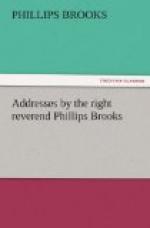In general, these two regions of our national life were separated by a geographical boundary. One was the spirit of the North, the other was the spirit of the South. But the Southern nature was by no means all a Southern thing. There it had an organized, established form, a certain definite, established institution about which it clustered. Here, lacking advantage, it lived in less expressive ways and so lived more weakly. There, there was the horrible sacrament of slavery, the outward and visible sign round which the inward and spiritual temper gathered and kept itself alive. But who doubts that among us the spirit of slavery lived and thrived? Its formal existence had been swept away from one State after another, partly on conscientious, partly on economical grounds, but its spirit was here, in every sympathy that Northern winds carried to the listening ear of the Southern slave-holder, and in every oppression of the weak by the strong, every proud assumption of idleness over labor which echoed the music of Southern life back to us. Here in our midst lived that worse and falser nature, side by side with the true and better nature which God meant should be the nature of Americans, of which he was shaping out the type and champion in his chosen David of the sheepfold.
Here then we have the two. The history of our country for many years is the history of how these two elements of American life approached collision. They wrought their separate reactions on each other. Men debate and quarrel even now about the rise of Northern Abolitionism, about whether the Northern Abolitionists were right or wrong, whether they did harm or good. How vain the quarrel is! It was inevitable. It was inevitable in the nature of things that two such natures living here together should be set violently against each other. It is inevitable, till man be far more unfeeling and untrue to his convictions than he has always been, that a great wrong asserting itself vehemently should arouse to no less vehement assertion the opposing right. The only wonder is that there was not more of it. The only wonder is that so few were swept away to take by an impulse they could not resist their stand of hatred to the wicked institution. The only wonder is, that only one brave, reckless man came forth to cast himself, almost single-handed, with a hopeless hope, against the proud power that he hated, and trust to the influence of a soul marching on into the history of his countrymen to stir them to a vindication of the truth he loved. At any rate, whether the Abolitionists were wrong or right, there grew up about their violence, as there always will about the extremism of extreme reformers, a great mass of feeling, catching their spirit and asserting it firmly, though in more moderate degrees and methods. About the nucleus of Abolitionism grew up a great American Anti-Slavery determination, which at last gathered strength enough to take its stand to insist upon the checking and limiting the extension of the power of slavery, and to put the type-man, whom God had been preparing for the task, before the world, to do the work on which it had resolved. Then came discontent, secession, treason. The two American natures, long advancing to encounter, met at last, and a whole country, yet trembling with the shock, bears witness how terrible the meeting was.




